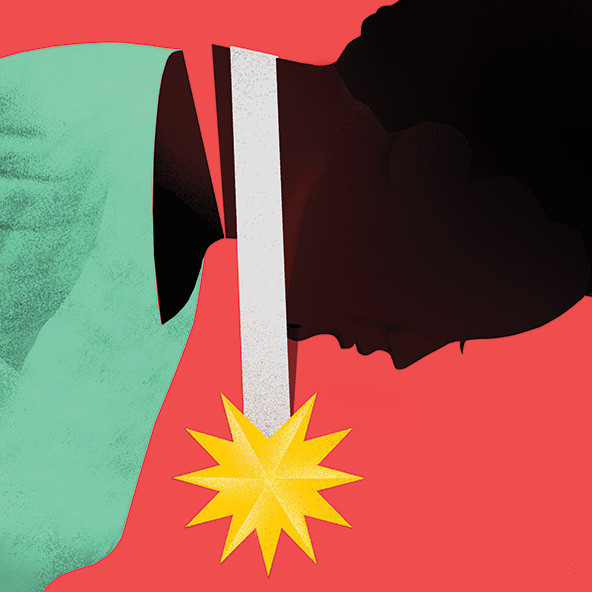 (Illustration by Brian Stauffer)
(Illustration by Brian Stauffer)
In 2020, Matthew Stanley, a postdoctoral researcher at Duke University’s Fuqua School of Business, watched as his wife, a resident physician, and her colleagues performed the stressful work of treating patients during a deadly pandemic. Around the same time, Stanley noticed a trend emerging in health-care settings: signs and artwork touting the message, “Thank you health-care heroes!” Reminded of his research on military veterans, who are often lionized in American society, Stanley wondered how heroizing language shaped public perceptions of workers and their professional experiences. Did the hero designation translate into higher pay, better benefits, or new opportunities?
Stanley teamed up with his advisor, Aaron C. Kay, a professor of management and organization at Duke’s Fuqua School of Business, to investigate the hero label, asking what the consequences are for those who have it applied to them. First, the researchers established that historically, “hero” had been ascribed to individuals who carried out extraordinary deeds, not entire groups such as today’s doctors, nurses, veterans, teachers, paramedics, and firefighters. Only in recent years has hero language and imagery—workers wearing capes, for example—proliferated on signs, screens, T-shirts, and posters. Investigating the effects for workers, the researchers discovered that heroization did not lead to better occupational outcomes, but instead to exploitation, even after a transition to a new career. Across nine studies of large samples of American residents, they tested how heroization influenced public expectations in ways that facilitated the exploitation of workers.
“We were interested in using naturalistic stimuli to understand what the imagery out there is doing to people,” Stanley says. “We were particularly interested in what’s available on the internet, messages that get pasted in classrooms in the context of teachers, that are put up in health-care centers in the context of health-care workers, and images of veterans and military personnel that show up at sporting events, on government websites, and at organizations that try to help veterans find employment.”
In one study, participants observed posters depicting nurses and veterans as heroes wearing capes. Then, using image-editing software to erase the capes, the researchers presented a control group with pictures of nurses and veterans in regular clothing. By randomly assigning the two conditions, they could determine the effects of heroization as participants made judgments about whether these workers should take on extra shifts without compensation or accept pay cuts. Since study participants believed that heroes are willing to sacrifice and engage in selfless behavior, they expected them to volunteer without compensation. “Selflessness and self-sacrifice are central components of heroism in Western cultures,” Stanley says, “at least in 2022 and 2023.”
While intended to show popular support and admiration for workers, heroization reduced public opposition to their exploitation, the researchers found. If nurses were expected to volunteer for an extra shift each month for no extra pay, then hospital systems could introduce this policy and encounter little resistance. However faulty the inference, study participants assumed that treating heroes poorly simply allowed them to act according to their values. Warning of the effects on employers if workers acquiesce to exploitative requests from management, perhaps fearing significant harms, the researchers cite “the potential to reinforce managers’ assumptions that people in heroized occupations want to be subjected to exploitation.”
Social scientists have long studied negative stereotypes and their consequences for individuals and society. But positive labels, which are often broadly accepted, have received much less scrutiny. After demonstrating how positive stereotypes can result in exploitation for nurses, veterans, teachers, and other “heroes,” the researchers found that heroization makes it difficult for the public to see workers as individuals with their own wants and needs.
“People assume that Americans enter the military because they want to selflessly serve their country,” Stanley says. “But it turns out that that’s not a major reason for going into the military. Consistent pay, job stability, retirement benefits, and health benefits are the main draw. The things that are distinctly non-heroic are what military members cite.”
The negative consequences of a pervasive positive label suggest that at least some psychological sources of exploitation are unintentional. “Stanley’s and Kay’s research raises troubling and important questions,” says David Sherman, a professor of social and health psychology at the University of California, Santa Barbara. “It should give society pause to think about the possible negative downstream implications that occur when we venerate heroes. My hope is that awareness of this phenomenon could help people appreciate the full humanity and motivational complexity that drives the actions of those we call heroic, and enable us to appreciate their contributions without putting them at risk for being exploited.”
Find the full study:
“The Consequences of Heroization for Exploitation” by Matthew L. Stanley and Aaron C. Kay, Journal of Personality and Social Psychology, forthcoming.
Support SSIR’s coverage of cross-sector solutions to global challenges.
Help us further the reach of innovative ideas. Donate today.
Read more stories by Daniela Blei.

